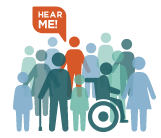The 2022 Nisonger Institute is on Friday, May 13th: Nisonger Institute 2022 – Nisonger Center (osu.edu)
Addressing the Social Determinants of Health for People with Developmental Disabilities
People with developmental disabilities face multiple barriers that have a direct and negative impact on their health. Many of these barriers are not random or accidental and include determining factors that extend beyond health care or individual health choices. In fact, the social, economic, and physical environment collectively play just as large of a role in our overall health and wellbeing as clinical care and individual health behaviors. These factors are often called the Social Determinants of Health, and include things such as housing, transportation, education, and employment. The Social Determinants of Health are the complex, integrated, and overlapping social structures, policies, and economic systems that affect health and quality of life outcomes. People with developmental disabilities are especially impacted by Social Determinants of Health. The cumulative effects of racism, ableism, educational disparities, income inequality, housing and food insecurity, transportation barriers, inaccessible health systems and services, and social isolation have substantial effects on the health and quality of life of people with developmental disabilities.
Keynote Speaker: Eric Emerson, PhD (him/his)
Eric Emerson is Emeritus Professor of Disability & Health Research at Lancaster University (UK) and Honorary Professor at the University of Sydney and Flinders University (Australia) He was founding co-Director of England’s specialist Public Health Observatory on intellectual disability. He was also Vice-President of IASSIDD (the international community of researchers and research centers in intellectual and developmental disability) where he was responsible for managing IASSIDD’s work program with the World Health Organization. He has been a member of several advisory groups to government and non-government organizations and has researched and written widely about the health and wellbeing of people with disabilities, especially people with intellectual disabilities. To read more, click here.
Social Determinants and the Health of People with Intellectual Disabilities
We know that people with intellectual disabilities have poorer health and shorter life expectancy than their non-intellectually disabled peers. In part, these inequalities in health status are biologically determined. In part, they are socially determined. Socially determined inequalities are avoidable, unjust and unfair; they are examples of health inequities. In this presentation I will attempt to summarize: (1) what we have learned about socially determined inequities in health; (2) what relevance this knowledge has on understanding the poorer health of people with intellectual disabilities; (3) what are the key research priorities for the future; (4) what are some of the key implications of this knowledge for policy and practice.

